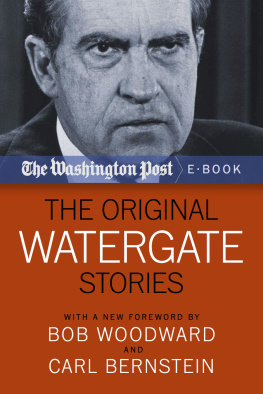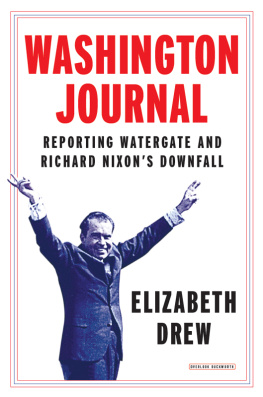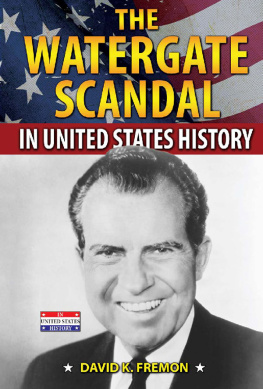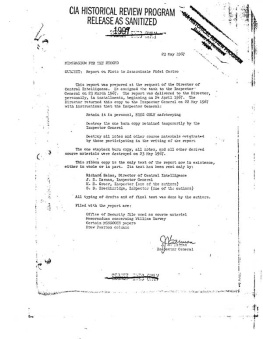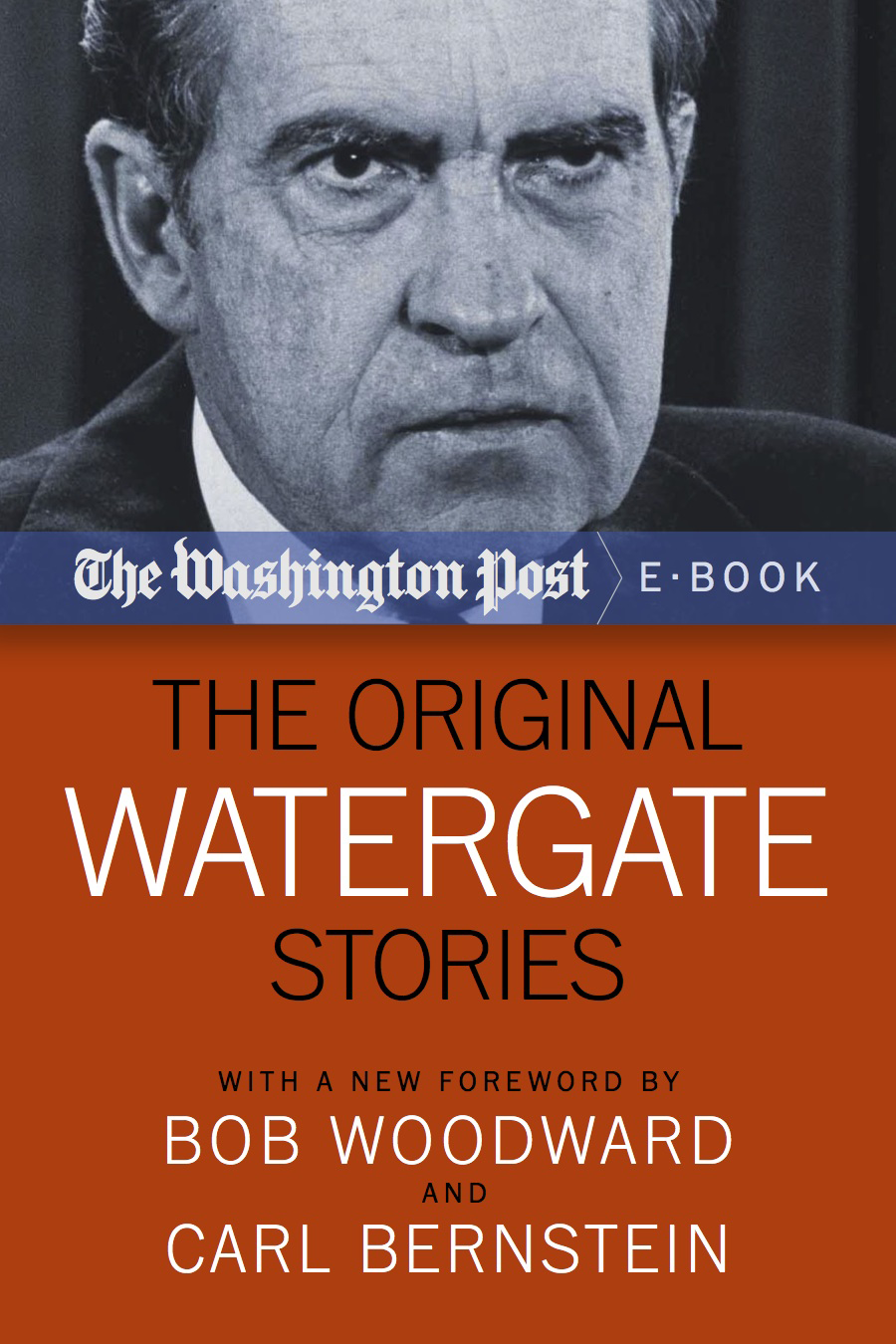Foreword
By Carl Bernstein and Bob Woodward
As Sen. Sam Ervin completed his 20-year Senate career in 1974 and issued his final report as chairman of the Senate Watergate committee, he posed the question: What was Watergate?
Countless answers have been offered in the 40 years since June 17, 1972, when a team of burglars wearing business suits and rubber gloves was arrested at 2:30 a.m. at the headquarters of the Democratic Party in the Watergate office building. Four days afterward, the Nixon White House offered its answer: Certain elements may try to stretch this beyond what it was, press secretary Ronald Ziegler scoffed, dismissing the incident as a third-rate burglary.
History proved that it was anything but. Two years later, Richard Nixon would become the first and only U.S. president to resign, his role in the criminal conspiracy to obstruct justicethe Watergate coverupdefinitively established. Another answer has since persisted, often unchallenged: the notion that the coverup was worse than the crime. This idea minimizes the scale and reach of Nixons criminal actions.
Ervins answer to his own question hints at the magnitude of Watergate: To destroy, insofar as the presidential election of 1972 was concerned, the integrity of the process by which the President of the United States is nominated and elected. Yet Watergate was far more than that. At its most virulent, it Watergate was a brazen and daring assault, led by Nixon himself, against the heart of American democracy: the Constitution, our system of free elections, the rule of law.
Today, much more than when we first covered this story as young Washington Post reporters, an abundant record provides unambiguous answers and evidence about Watergate and its meaning. This record has expanded continuously over the decades with the transcription of hundreds of hours of Nixons secret tapes, adding detail and context to the hearings in the Senate and House of Representatives; the trials and guilty pleas of some 40 Nixon aides and associates who went to jail; and the memoirs of Nixon and his deputies. Such documentation makes it possible to trace the presidents personal dominance over a massive campaign of political espionage, sabotage and other illegal activities against his real or perceived opponents.
In the course of his 5-year presidency, beginning in 1969, Nixon launched and managed five successive and overlapping warsagainst the anti-Vietnam War movement, the news media, the Democrats, the justice system and, finally, against history itself. All reflected a mind-set and a pattern of behavior that were uniquely and pervasively Nixons: a willingness to disregard the law for political advantage, and a quest for dirt and secrets about his opponents as an organizing principle of his presidency.
Long before the Watergate break-in, gumshoeing, burglary, wiretapping and political sabotage had become a way of life in the Nixon White House. What was Watergate? It was Nixons five wars.
The war against the antiwar movement
Nixons first war was against the anti-Vietnam War movement. The president considered it subversive and thought it constrained his ability to prosecute the war in Southeast Asia on his terms. In 1970, he approved the top-secret Huston Plan, authorizing the CIA, the FBI and military intelligence units to intensify electronic surveillance of individuals identified as domestic security threats. The plan called for, among other things, intercepting mail and lifting restrictions on surreptitious entrythat is, break-ins or black bag jobs.
Thomas Charles Huston, the White House aide who devised the plan, informed Nixon that it was illegal, but the president approved it regardless. It was not formally rescinded until FBI Director J. Edgar Hoover objectednot on principle, but because he considered those types of activities the FBIs turf. Undeterred, Nixon remained fixated on such operations.
In a memorandum dated March 3, 1970, presidential aide Patrick Buchanan wrote to Nixon about what he called the institutionalized power of the left concentrated in the foundations that succor the Democratic Party. Of particular concern was the Brookings Institution, a Washington think tank with liberal leanings.
On June 17, 1971exactly one year before the Watergate break-inNixon met in the Oval Office with his chief of staff, H.R. Bob Haldeman, and national security adviser Henry Kissinger. At issue was a file about former president Lyndon Johnsons handling of the 1968 bombing halt in Vietnam.
You can blackmail Johnson on this stuff, and it might be worth doing, Haldeman said, according to the tape of the meeting.
Yeah, Kissinger said, but Bob and I have been trying to put the damn thing together for three years. They wanted the complete story of Johnsons actions.
Huston swears to God theres a file on it at Brookings, Haldeman said.
Bob, Nixon said, now you remember Hustons plan? Implement it.... I mean, I want it implemented on a thievery basis. God damn it, get in and get those files. Blow the safe and get it.
Nixon would not let the matter drop. Thirteen days later, according to another taped discussion with Haldeman and Kissinger, the president said: Break in and take it out. You understand?
The next morning, Nixon said: Bob, get on the Brookings thing right away. Ive got to get that safe cracked over there. And later that morning, he persisted, Whos gonna break in the Brookings Institution?
For reasons that have never been made clear, the break-in apparently was not carried out.
The war on the news media
Nixons second war was waged ceaselessly against the press, which was reporting more insistently on the faltering Vietnam War and the effectiveness of the antiwar movement. Although Hoover thought he had shut down the Huston Plan, it was in fact implemented by high-level Nixon deputies. A Plumbers unit and burglary team were set up under the direction of White House counsel John Ehrlichman and an assistant, Egil Krogh, and led by the operational chiefs of the future Watergate burglary, ex-CIA operative Howard Hunt and former FBI agent G. Gordon Liddy. Hunt was hired as a consultant by Nixon political aide Charles Colson, whose take-no-prisoners sensibility matched the presidents.
An early assignment was to destroy the reputation of Daniel Ellsberg, who had provided the Pentagon Papers, a secret history of the Vietnam War, to the news media in 1971. Publication of the documents in the New York Times, the Washington Post and eventually other newspapers had sent Nixon into rants and rages, recorded on his tapes, about Ellsberg, the antiwar movement, the press, Jews, the American left and liberals in Congressall of whom he conflated. Though Ellsberg was already under indictment and charged with espionage, the team headed by Hunt and Liddy broke into the office of his psychiatrist, seeking information that might smear Ellsberg and undermine his credibility in the antiwar movement.

